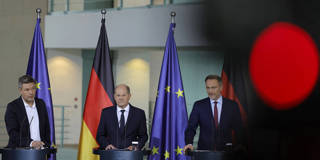The recent decision by the German Constitutional Court to block the government’s plan to redirect €60 billion in unused pandemic funds toward climate-related projects has underscored the growing divisions within Germany’s three-party ruling coalition. Moreover, the decision is set to undermine economic growth at a critical moment.
BERLIN – Earlier this month, Germany’s Constitutional Court ruled that the government’s plan to redirect unused COVID-19 aid funds toward combating climate change violated the so-called debt brake. The decision is not just a setback for Chancellor Olaf Scholz; it could also deepen the ideological divisions within the coalition government and undermine the country’s fiscal policy, thereby posing a grave threat to its economic outlook.

BERLIN – Earlier this month, Germany’s Constitutional Court ruled that the government’s plan to redirect unused COVID-19 aid funds toward combating climate change violated the so-called debt brake. The decision is not just a setback for Chancellor Olaf Scholz; it could also deepen the ideological divisions within the coalition government and undermine the country’s fiscal policy, thereby posing a grave threat to its economic outlook.